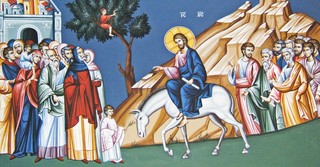- Recent Translations
- All Translations
Matthew 23:39
Share
Settings
Matthew 23:39 in Other Translations
Matthew 23:39 Meaning and Commentary
For I say unto you, ye shall not see me henceforth
Meaning in a very little time after the passover, from the time of his crucifixion and death; otherwise they saw him many times after this, as in the palace of the high priest, in Pilate's judgment hall, and on the cross; but not after his resurrection. This shows the reason of their house being desolate, and in what sense it should be so, and immediately became so; namely, by being then directly, and ever after, destitute of his presence: and though they might afterwards seek for, and expect the Messiah in it, yet they would never be able to see him, nor throughout their long captivity: till ye shall say, blessed is he that cometh in the name of the Lord; that is, until the time comes, that the fulness of the Gentiles shall be brought in, and all Israel shall be saved, the Jews shall be converted, and seek the Lord their God, and David their king; when they shall readily and cheerfully say these words to Christ, who will then appear in his glory; which they were now displeased at in the multitude that followed him, and the children in the temple. Though some think this is said by way of threatening, since the rest that is spoken to them by Christ is of that sort, and regards the men of that generation; and is given as a reason of their house being left desolate: and the sense is, that they should never see him with joy and pleasure; since, though they would be obliged to confess that he was Lord and Christ, they would never say the above words to him in faith, and holy reverence of him. The Cambridge exemplar of Beza's, and the Persic versions, read, "in the name of God."
Matthew 23:39 In-Context
Related Articles
Cross References 1
-
1.
Psalms 118:26 ;Matthew 21:9
Footnotes 1
- [a] Psalm 118:26
